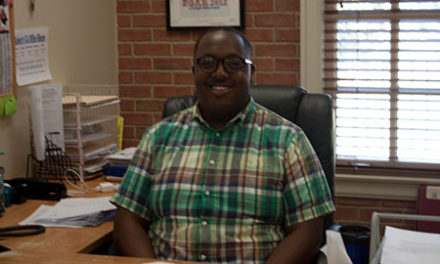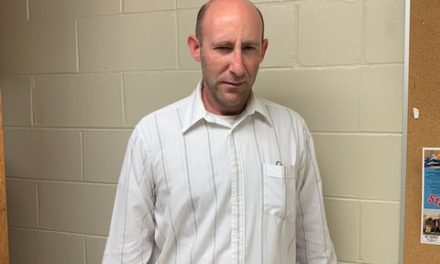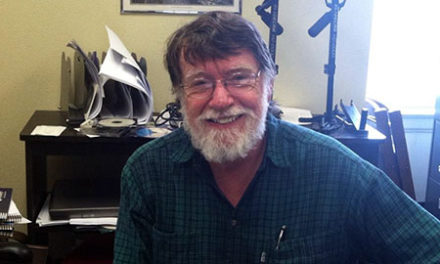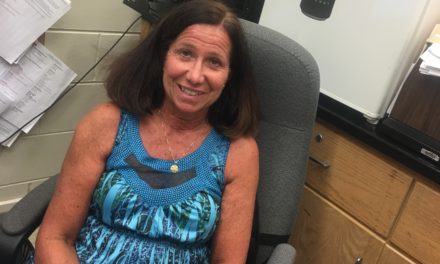By Kristen Griffith, The Whetstone
Wesley men’s and women’s track coach Stephen Kimes recruited about 60 freshmen to join the college’s track and field team in 2013.
“It was considered the largest recruiting class in the country among any division that year,†he said.
Three years later, many of Kimes’ athletes, including some of the original 60, are now All-Americans and national champions.
The team won its first championship this year with the men’s 4×100 meter relay team, and the individual 100-meter race.
Multi-record breaking and All-American runner Dominic McAnulty said he likes Kimes’ coaching style.
“He’s very direct with what he wants, he’s very flexible too,†McAnulty said. “He’s very positive but if you start to slack he’ll definitely let you know.â€
Before Kimes arrived, the track and field program was unsuccessful.
“I looked at some of the CAC [Capital Athletic Conference] results and I think the women didn’t even score a point in one of the championships,†he said. “The times were not good collegiate times.â€
During his first year, Kimes helped improve the runners who were already there.
“I worked them out hard and they got better, and some of them made All-Conference for the first time in their careers,†he said.
Kimes said the athletic conference is full of strong distant runners, but since it’s harder to train freshmen to be collegiate distance runners.
“I figured the quickest way to be more competitive in the conference was to go for sprinters, jumpers, hurdlers, throwers, some of your skilled events,†he said. “Next thing you know, you have a national championship or All-American caliber group.â€
Senior Angel Hall said she wasn’t the best runner until she started working with Kimes.
“We had to do some different things – things that teams aren’t usually doing,†Hall said.
She said they ran in abandoned malls, on turf fields, at the post office and on the highway.
“But that all paid off because I’m a two-time All American,†she said.
Kimes said missing an outdoor track isn’t a disadvantage.
“If Wesley is to ever get a track, I’d rather they get an indoor track,†he said. “I can find places to workout outdoors.â€
He said an outdoor track would be beneficial to athletes practicing long jumps and relay hand-offs.
Kimes said the hard part about being track-less is finding different locations for practice and coordinating with other people to use their facilities. Last year, the team started using the old Dover High School’s track.
“We finally started using the track consistently and we got five national champions out of it, so maybe it does help,†he said.
A picture frame sits on a wooden desk in the corner of Kimes’ office with a quote inside: “Believe and succeed. The key to happiness is having dreams… the key to success is making dreams come true.â€
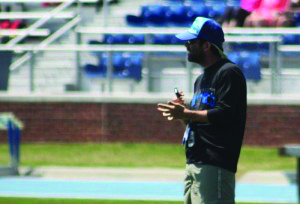
Stephen Kimes is the head track and field coach | wesley.edu
Athletes roam in and out of his office signing NCAA forms and picking out their uniforms from the bins that sat in the middle of his floor.
Kimes said it’s difficult being the only official track and field coach, and catering to 80 athletes – both men and women
McAnulty said Kimes takes care of his athletes.
“Over the summer he called me just to see how I’m doing,†he said.
He said Kimes’ relationship with the team is personalized, especially if he sees dedication.
“The more you show effort towards getting better and helping the team get better, then he’s going to share that special bond with you,†he said.
Hall described Kimes as wise and motivating.
“He tries to keep you on track and makes sure you reach your full potential,†she said.
Hall said she reluctantly started running the 400-meter race thanks to Kimes. Now, it’s her best event.
Kimes has a history with rebuilding programs. He turned around Carver Vocational Technical High School’s boys track team located in Baltimore City.
“It was a situation where the program was not too good, and in our third year we won our third state title,†he said.
The team went on to win four state championships in five years.
“I felt like I knew how to build programs to generate good teams,†he said.
Kimes spent his first 17 years in Martinsburg, W.V.
He’s lived in several states since, including South Carolina, Maryland and Ohio.
“Now I’m in Delaware, and Delaware is a really nice state,†he said. “I’m grateful for the opportunity Wesley College gave me and Coach Drass picking me out of the many applicants.â€
Kimes said during his teenage years he enjoyed playing soccer more than running track.
“In soccer I was an outside midfielder, I actually had my high school record in assists,†he said.
In high school track, he ran cross-country, the 5K and the 10K.
Kimes decided to attend Marshall University and run track rather than attend Bethany College and play soccer. He said he would rather not be known at a bigger school, than be known at a smaller school.
He received his undergraduate degree in elementary education, K-8. He received his master’s in physical education and athletic administration.
Kimes said he didn’t know he wanted to coach until his friend bugged him to help coach his middle school track team.
“A friend of mine needed a distance coach,†he said. “I didn’t even want to do it.â€
His friend later left for a new job in Virginia, while Kimes stayed in West Virginia and became head coach. Kimes has now been head coaching for 14 years.
“It’s been a long road,†he said.
Kimes has a six-year-old daughter named Holland with his wife of ten years, Kristen.
They’ve been together since he was 19 years old.
“She was a mid-distance runner at Marshall,†he said. “We met one time and talked a little bit. At that time I had red hair, yellow hair, green hair and earrings everywhere.â€
Kimes said he wants to be a good father and spend time with his daughter.
“I wish I got to spend more time with her and be part of her extracurricular activities,†he said. “As I get older and more into this profession, I’m starting to realize that should be most important.â€
He said track doesn’t allow him to have much free time.
“When the season starts in August, I don’t really get a lot of free time at all,†he said. “I’m on the road pretty much 26 weekends a year.â€
He said track meets can last 12 hours in a day or even two days.
“You get a blurry hangover that can last for weeks,†he said. “I can only imagine what the athletes are going through to go from doing that and going back to class.â€
He said it was a relief to win those championships.
“You look back at running around a gym as your indoor practice or not having a track, we’re nomads,†he said. “It was really a relief for us for all the time and creativity we had to use.â€

